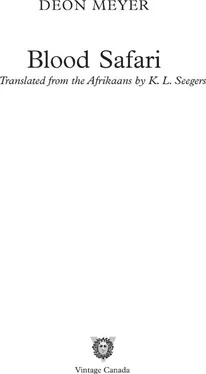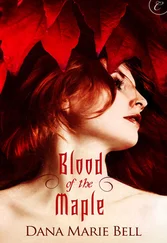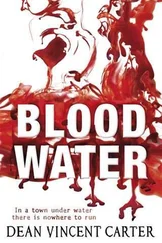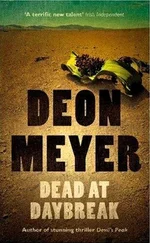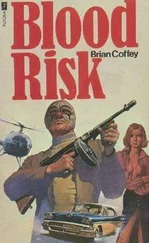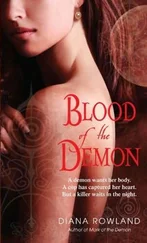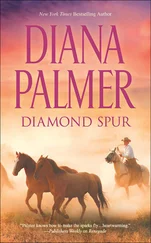Deon Meyer - Blood Safari
Здесь есть возможность читать онлайн «Deon Meyer - Blood Safari» весь текст электронной книги совершенно бесплатно (целиком полную версию без сокращений). В некоторых случаях можно слушать аудио, скачать через торрент в формате fb2 и присутствует краткое содержание. Жанр: Старинная литература, на английском языке. Описание произведения, (предисловие) а так же отзывы посетителей доступны на портале библиотеки ЛибКат.
- Название:Blood Safari
- Автор:
- Жанр:
- Год:неизвестен
- ISBN:нет данных
- Рейтинг книги:4 / 5. Голосов: 1
-
Избранное:Добавить в избранное
- Отзывы:
-
Ваша оценка:
- 80
- 1
- 2
- 3
- 4
- 5
Blood Safari: краткое содержание, описание и аннотация
Предлагаем к чтению аннотацию, описание, краткое содержание или предисловие (зависит от того, что написал сам автор книги «Blood Safari»). Если вы не нашли необходимую информацию о книге — напишите в комментариях, мы постараемся отыскать её.
In Blood Safari
A complicated man with a dishonorable past, Lemmer just wants to do his job and avoid getting personally involved. But as he and Emma search for answers from the rural police, they encounter racial and political tensions, greed, corruption, and violence unlike anything they have ever known.
Blood Safari — читать онлайн бесплатно полную книгу (весь текст) целиком
Ниже представлен текст книги, разбитый по страницам. Система сохранения места последней прочитанной страницы, позволяет с удобством читать онлайн бесплатно книгу «Blood Safari», без необходимости каждый раз заново искать на чём Вы остановились. Поставьте закладку, и сможете в любой момент перейти на страницу, на которой закончили чтение.
Интервал:
Закладка:
‘No.’
‘She’s looking for her brother.’
‘Hectic, man. Did she find him?’
‘No, but I’m going to try. You can help.’
‘Just say the word, bru’.’
I had been upgraded. From ‘man’ to “bru”. ‘Do you know Edwin, the gate guard?’
‘I know him.’
‘Do you know where he lives?’
‘Sure. About half a kay from the Acornhoek train station. It’s about twenty kays from here. You take the Nelspruit road until you see the sign. I could show you, but I’m on duty. Anyway, you can’t miss it. Turn left just past the Acornhoek station, and he’s on the left. In front of the house, he’s got this low concrete wall with like half a wagon wheel motif and he’s painted it pink. Radical, bru’.’
‘I’ll find it. Do you know what his surname is?’
He thought hard. ‘No. I know I should, but I don’t.’
‘It doesn’t matter. One other thing, there’s a possibility that Emma’s brother worked at Mogale. The rehabilitation centre. I’m looking for information about the place.’
He shook his head. ‘That’s the funny farm, bru’.’
‘Oh?’
‘Bunch of weird dudes, let me tell you.’
‘Tell me.’
‘Radical, man. They’re radical.’
Like a pink concrete wall? Or Emma’s beauty?
‘In what sense of the word, Dick?’
‘Like in cuckoo, bru’, like hectic radical, you know?’
I didn’t know. Dick spoke a language that would take a while to unravel. ‘Can you be a little more specific?’
‘I don’t have, like, proof, bru’. But you hear stuff.’
‘Like what?’
‘Like … well, let me tell you.’
30
Dick said that two years earlier, only a couple of months after he had started at Mohlolobe, there was a message for him at reception from a man by the name of Domingo Branca. The content was informal and friendly: would he like to meet other young people in the district? Come and have a drink on Saturday night at the Warthog Bush Pub, a local watering hole at the airfield beside the Guernsey gravel road.
There had been four of them. Donnie Branca and Cobie de Villiers from Mogale, David Baumberger of Molomahlapi Private Game Reserve and Boetie Strydom of the Makutswi Wildlife Ranch. Initially it was a light-hearted evening. They welcomed him to the Lowveld, enquired about his background, gossiped about their respective employers, swapped stories about the sexual opportunities tourists provided, the oddest places and circumstances where they had offered these services, and the scandalous state of rugby.
The typical conversation between young unmarried men.
Branca was the leader of the group; that was obvious from the beginning. Baumberger was the clown, Strydom the experienced one who had grown up in the area and De Villiers had said practically nothing.
Quite a few hours and beers later, Branca had steered the conversation in another direction. It was only a year later, when he heard the other stories, that Dick realised how skilfully it had been done. From gossip, sex and rugby to animal stories, conservation, concern over ongoing development, the multiplication of game farms, the competition, the poor management of the National and Provincial Parks, land claims, the growing threat to the ecosystem. It was done carefully, without radical statements, no direct accusations or politically incorrect remarks. Just a polite testing of the water: where did Dick stand with regard to all these questions?
Dick didn’t actually stand anywhere. He was just a lapsed surfer from Port Elizabeth who had found a career and a job that suited his chosen lifestyle like a glove. He was outdoors all day, he thought nature was ‘cool’ and he liked the way tourists hung on his every word when he shared the information he had picked up along the way.
‘I went back to the pub the next weekend, but they weren’t there. And later, I sort of clicked – it was, like, I flunked a test, you know. And they never invited me again.’
In the months after that he began to hear the rumours. Nothing concrete, a bit here and a fragment there, from diverse sources and places. First there were the anonymous warning letters to farmers, communities and businesses about the damage they were doing to the environment. Later, the letters became threatening. They were always signed with the initials H. B.
Then there were more than letters.
Photographs of black game wardens cooking a buck over a fire were delivered to the Kruger Park management. Things happened in the night. An entire community’s dogs were poisoned at Ga-Sekororo between the Lagalameetse Nature Reserve and the Makutsi Conservancy, mtimidating shots were fired at night on the tribal lands of a group that had a land claim against a famous game farm.
Nobody knew who was responsible. As always, there were theories and accusations, blame and denial. The letters H. B. were responsible for most of the speculation. Hendrik Bester, the banana farmer, was harassed so much that he considered selling his land and moving away. People fought over whether it was a Latin, Afrikaans, English, sePedi or Venda abbreviation.
The incidents began to escalate. Two suspected poachers were severely injured by leopard gin traps on the footpaths used by the people of Tlhavekisa near the Manyeleti Game Reserve. A sawmill burned down outside Graskop. It had been polluting a wetland. Two men from Dumfries were badly beaten up and tied to the impala that they had poached in the Sabi Sands Game Reserve. Dogs were shot dead in the veld. A man and a woman who specialised in the slaughter of animals for traditional medicinal purposes were assaulted. Like the impala thieves, they told of the terrifying silence and efficiency of the night-time attacks. Not a word was said to them. The attackers were masked. Two methods whereby people are identified in this part of the world, skin colour and dialect, were effectively neutralised. There were not enough incidents to create panic or hysteria. They were sporadic, spread over months, two provinces and thousands of square kilometres. The stories took time to loosen tongues and fire speculation. The only clue was the abbreviation.
H. B.
The most stubborn rumour held that it stood for honey badger, or honey badgers, since they were a group. Who had first promulgated that theory was unclear.
There were so many rumours about who was behind the H. B. front that Mogale and its people were lost in the hubbub. Sometimes they came under the spotlight. Maybe because they made no secret of their opposition to development, habitat damage and informal poaching. Maybe because they never spoke up to condemn the H. B. activities. Maybe because their tame honey badger was the most famous in the province. But since Cobie de Villers had been identified by eyewitnesses as the broad-daylight murderer of three vulture poisoners and a sangoma, the focus of suspicion was fully on Mogale. The death of Frank Wolhuter had launched a new series of rumours. That Frank had been the brains behind H. B. but had got cold feet and been murdered by his followers. That a reaction force from the black community had killed him. That a branch of the State Intelligence services had been responsible for his execution.
‘It’s crazy, bru’, the shit that’s flying around.’
‘Why has the shit not hit the newspapers?’
‘Some of the local rags had stuff, but nobody really knows what the fuck is going on.’
‘Why “honey badger”?’
‘Dunno, bru’. Your guess is as good as mine. Maybe because a honey badger is a very, very tough little dude, takes shit from nobody and nothing. Moves around sort of on its own, invisible, in the undergrowth, takes care of scary stuff like snakes. And it’s a total survivor. Awesome symbol, don’t you think?’
Читать дальшеИнтервал:
Закладка:
Похожие книги на «Blood Safari»
Представляем Вашему вниманию похожие книги на «Blood Safari» списком для выбора. Мы отобрали схожую по названию и смыслу литературу в надежде предоставить читателям больше вариантов отыскать новые, интересные, ещё непрочитанные произведения.
Обсуждение, отзывы о книге «Blood Safari» и просто собственные мнения читателей. Оставьте ваши комментарии, напишите, что Вы думаете о произведении, его смысле или главных героях. Укажите что конкретно понравилось, а что нет, и почему Вы так считаете.
